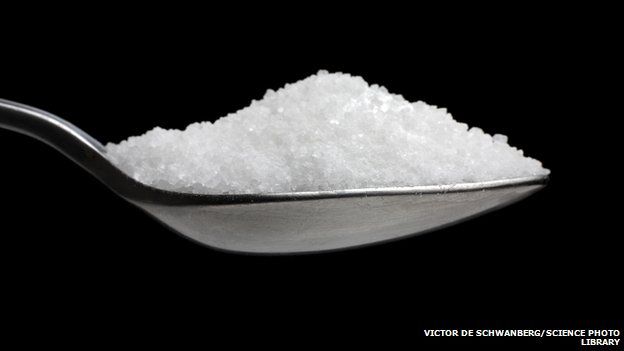Fruit snacks 'contain more sugar than sweets'
- Published

Many supposedly "healthy" fruit snacks aimed at children contain more sugar than sweets, says a campaign group.
Action on Sugar looked at 94 products on UK sale, such as coated dried fruit, and found a third contained three or four teaspoons of sugar and 85% were more sugary than Haribo Starmix sweets.
Child health experts said the findings were frightening.
The industry pointed out that most of the snacks had no added sugars, and those that did were clearly labelled.
Action on Sugar said that parents should give their children fresh fruit and vegetables instead of processed fruit snacks.
And it called on food manufacturers to stop adding unnecessary sugars to fruit-based snacks while labelling them as contributing to "one of your five a day".
Katharine Jenner, campaign director at Action on Sugar, said: "Parents find it hard enough to know what 'healthy' is without food manufacturers confusing matters with misleading claims.
"Whole, unprocessed fruit is healthier than processed fruit snacks and fruit juice drinks, as it contains vitamins, minerals, water and fibre, and does not cause the devastating tooth decay we see in young children today."
A child would have to eat an entire punnet (240g) of strawberries to take in the same number of grams of sugar as in some processed fruit snacks.
Colin Michie, chairman of the nutrition committee at the Royal College of Paediatrics and Child Health, said the findings were "stunning" and "frightful".
"None of us needs sugar in our diets at all. It is all completely unnecessary.
"Fruit contains fibre, which we all need to function properly, but in these snacks the benefits of fruit have been sacrificed by covering them in yogurt and other sugary coatings."
How much sugar in processed fruit snacks?
- The Fruit Factory Sports Mix-Ups (5x18g) - 81g of sugar per 100g* or 3.6 teaspoons** of sugar per serving
- Tesco Yogurt Coated Strawberry Fruit Bites (25g) - 70.1g of sugar per 100g or 4.4 teaspoons of sugar per serving
- Fruit Bowl Fruit Flakes Raspberry Rush (25g) - 69g of sugar per 100g or 4.3 teaspoons of sugar per serving
- Whitworths Sunny Raising Coated Custard Raisins (25g) - 68.6g of sugar per 100g or 4.3 teaspoons of sugar per serving
- Organix Goodies Organic Fruit Gummies strawberry and apple (12g) - 67.2g of sugar per 100g of the snack or 2 teaspoons of sugar per serving
Source: Action on Sugar
*Haribo Starmix contains 47g of sugar per 100g
**One teaspoon of sugar is equal to four grams of granulated sugar
Mr Michie said sugar reduction targets were necessary to persuade children and adults to change their eating habits.
This would mean food manufacturers gradually reducing the amount of sugar they add to food over time.
However, Barbara Gallani, director of regulation, science and health at the Food and Drink Federation, said: "Dried and pureed fruit and vegetables count as part of your 'five-a-day' under government guidance, alongside fresh, tinned and frozen.
"About two thirds of the fruit snacks surveyed contain no added sugars and of the third that do, far from being 'hidden', this is clearly listed on the pack in the ingredients panel.
"Parents can use this information to compare and choose between products."
Katharine Teague, head of advocacy at the international company AB Sugar, said it was important to consider "the many contributory factors", such as lifestyle and diet, in tackling obesity.
She added that manufacturers were required by law to provide nutritional information on all pre-packaged foods and drinks found in the UK.
Aubrey Sheiham, emeritus professor of dental public health at University College London, said fruit snacks with high levels of hidden sugars were causing problems with children's teeth.
"Tooth decay is the most common cause of pain in children and the main reason why children are admitted to hospital.
"The worldwide epidemic of tooth decay will only be controlled when manufacturers markedly reduce the levels of sugars in their products."
Latest figures show that tooth decay currently affects nearly 30% of five-year-olds.
Meanwhile, around 34% of girls and 33% of boys aged 11 to 15 are overweight or obese.
A Department of Health spokesman said tackling obesity and reducing sugar intake was a major priority.
"We have already taken billions of calories out of the food and drink market over the past few years by working with industry, and we continue to consider our next steps," he said.
- Published26 June 2014
- Published11 November 2014
- Published22 June 2014
- Published5 May 2014